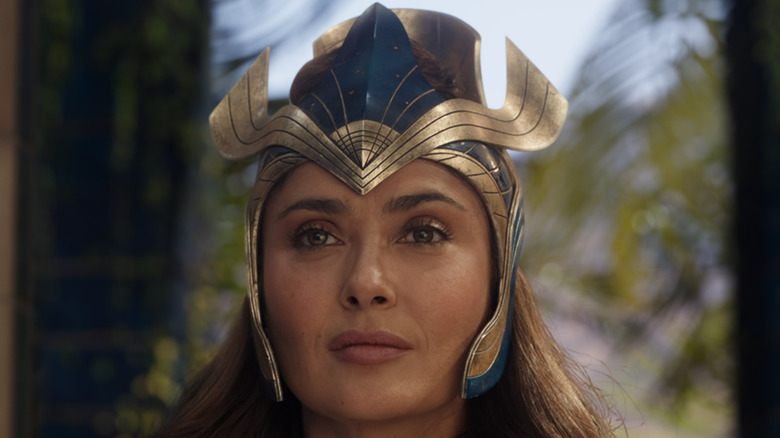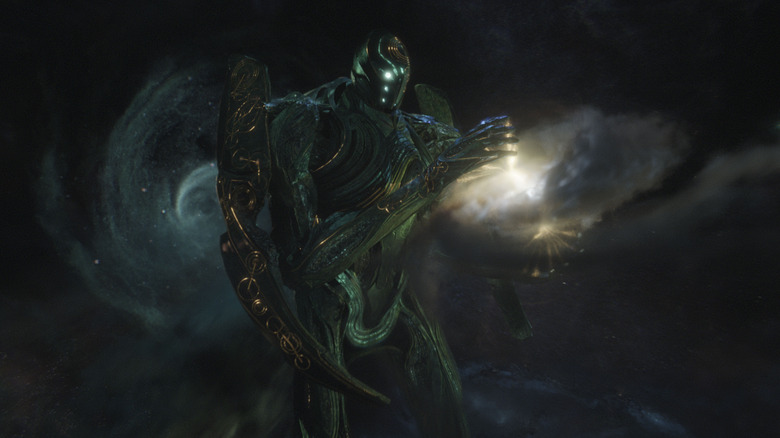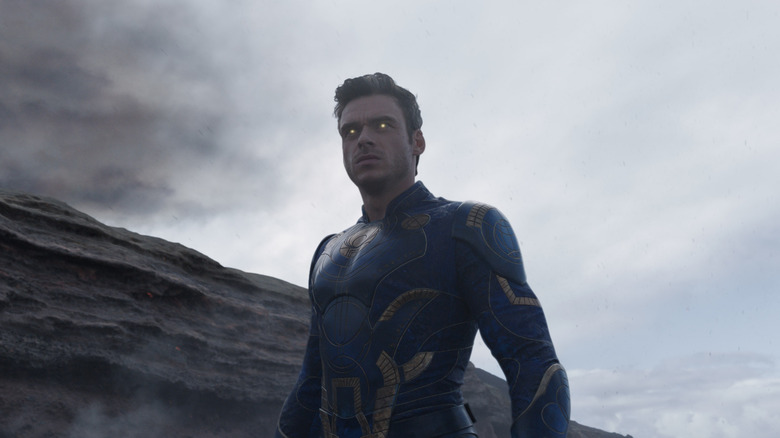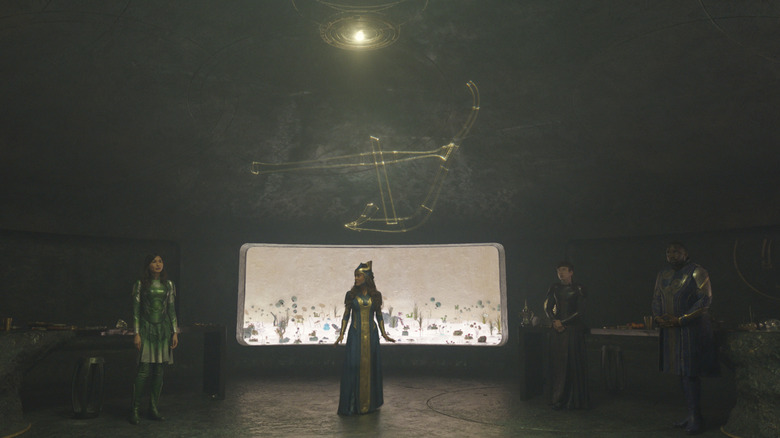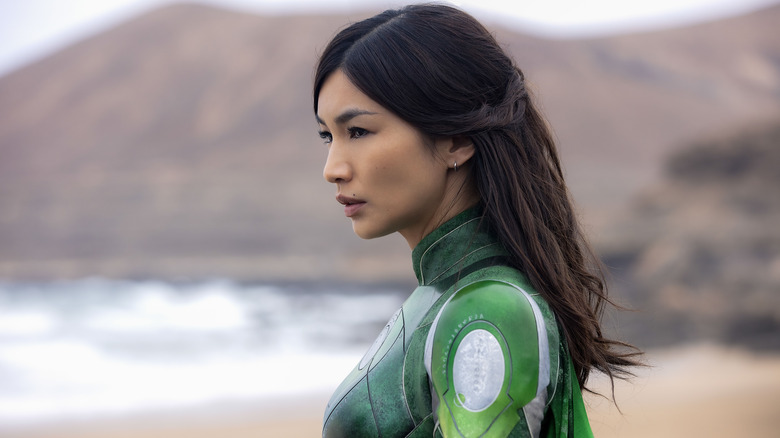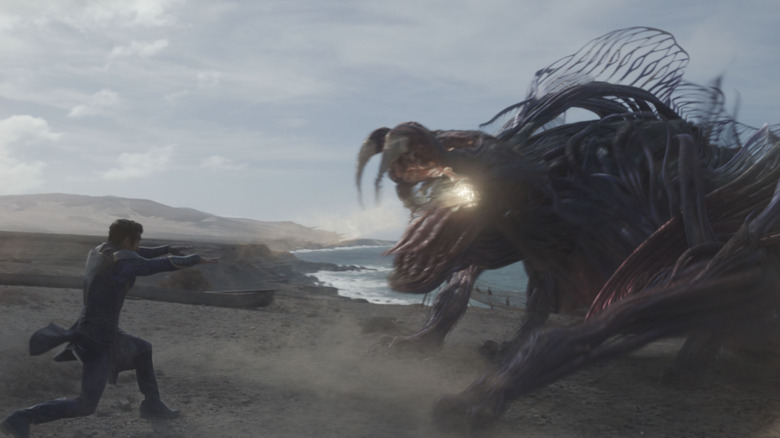Biggest Unanswered Questions In Eternals
"Eternals" is one of the most ambitious Marvel Studios films to date. It's an origin story for almost a dozen characters in some capacity, and it introduces a metric ton of new intergalactic lore to the MCU. It seldom interacts with any existing storylines, meaning all of this is brand new in-universe information. With that many characters and that many moving parts being part of a story that's thousands of years long, it's no surprise that certain things don't get clear resolutions.
Phase 4 is about introducing new characters and setting up new storylines, so unanswered questions are sometimes a feature just as much as a bug. Some of these are clearly going to be answered in upcoming installments of the MCU. Others are just head-scratching plot points that may never be brought up again. Either way, we've compiled some of the biggest unanswered questions we have after seeing "Eternals."
This is your last warning: heavy spoilers for "Eternals" follow.
What will happen to the frozen Celestial?
The movie's climax sees the Eternals joining powers and stopping the Celestial from destroying the Earth. After some infighting and trepidation, they all worked together and petrified him just as he was emerging from the sea. A happy ending for humanity — not so much the Eternals, who now have to answer for sabotaging their own mission, but certainly for humanity. Right?
Well, happy, yes. An ending? Not so much. When the Eternals discussed their plan, it was clear that they were only planning on freezing the Celestial. It doesn't seem like that plan changed, and the fact that his body is still undamaged certainly implies he could still be alive. Will the Eternals be there when he breaks free? Will they find a way to extract him without severely damaging the planet? Time will (hopefully) tell — especially if humanity isn't deemed worthy enough once Arishem examines the Eternals' memories.
Even if he's dead, though, there's still a frozen Celestial emerging from the planet's core. If nothing else, that's going to ruin more than a few days somewhere in the world.
What does Blade want with Dane?
During the final post-credits scene in "Eternals," we see Dane Whitman approach a sword. As he reaches out to grab it, a voice asks him if he's sure he wants to do that. This raises a few questions, some of which are answerable, and others of which won't be answered for a while.
Dane Whitman is better known to most comics fans as the Black Knight. He's a superhero with a mystical sword, and a descendent of the original Black Knight — an early Marvel character. His uncle — likely the one whom Sersi said he had a strained relationship with — is another Black Knight, albeit a villainous one. It's certain that we'll see Dane as the Black Knight in future adventures, but the nature of those adventures, as well as the intricacies of his family relationships, are unknown.
There was also another question we had, albeit briefly: Who addresses Dane? We never see the face nor body associated with the voice. Zhao herself cut down the speculation on the day of release, when she revealed to Fandom that "That was the voice of one of my favorite superheroes, Mr. Blade himself. Blade, Blade, Blade, yeah!"
It's exciting that Mahershala Ali's take on Blade finally exists in the MCU. This, in turn, raises another question: Why is Blade addressing Dane? Isn't his purview vampires? It's true that Jon Snow basically died and came back to life, but that doesn't mean every character Harington plays is a vampire ... does it?
Where did Ikaris go?
Ikaris is among the most thoroughly developed members of the Eternals, and in the ensemble, he's arguably one of the two or three main characters. Partly because of this, his future is pregnant with more possibilities than anyone else on the team. Originally hellbent on releasing the latent Celestial from earth's crust, his love of Sersi wins out and he reneges on his mission. When we last see him, he's flying far away from Earth, into a star.
The obvious question is: what next? We didn't see him when Arishem came back to Earth, and we didn't see him on the ship in the post-credits scene. He's almost certainly still out there, but where? The two most likely possibilities are that he informed Arishem himself of what happened, likely seeking some kind of atonement, or that he went into hiding from Arishem entirely. Either way, we'll almost certainly see him again and find out what happens next.
Doesn't offering humans guidance and technology count as interfering?
Early in the movie, Dane asks Sersi the question we've all had since "Eternals" was announced: why did they stay out of various human conflicts, up to and including the one with Thanos? The answer: the Eternals were explicitly instructed not to get involved with any human affairs that didn't involve the Deviants. Okay, fair enough. That raises another question: what about all that other interfering you did?
As an example, we see the Eternals protect the residents of Babylon from the Deviants, and it can be inferred that the Walls of Babylon were meant to protect humans from Deviants. But the Eternals were far more than mere protection for the Babylonians — they were the most important and influential beings there. They provided leadership, guidance, and entertainment for the comparatively primitive culture.
We do eventually find out that the Eternals fight off the Deviants entirely so their planet will develop the requisite amount of intelligent life to incubate a Celestial. This explains some of it, like how Phastos developed farming equipment. But Phastos didn't know about the true purpose of the mission until much later. If nothing else, surely they would have realized over the course of centuries that finite resources often lead to conflict. Either way, they sure interfered a lot for people who weren't supposed to interfere.
When did Sersi get the power to turn living beings into trees?
Sersi's exact powers are a bit nebulous, but it's generally enough to say she's able to manipulate inanimate matter. This mostly takes the form of changing something's density or turning one form of matter into another. Halfway through the movie, she surprises herself with a new power: she somehow turns a Deviant into a tree. This is a major turning point in the movie, one that sets up the climactic attempt to freeze the Celestial.
It's also never explained how she got that power.
At one point, she's asked point blank when it happened. She responds that she doesn't know, in a tone that shows she's clearly baffled herself. At no point in the film's runtime is it ever explained exactly how she developed this power or how long she's had it. It's possible that becoming the leader of the Eternals after Ajak's death contributed, but that's never mentioned nor explored. The power is plot critical, but the reason she has that power remains a mystery.
What's the deal with Eros?
Much to the chagrin of many moviegoers and Marvel's PR department, the "Eternals" post credits scene was leaked by a few members of the west coast press: Harry Styles has joined the MCU as Eros, Thanos' handsome and charismatic brother. Marvel tried very hard to hide this, going so far as to cut both post credits scenes and the credits themselves from screenings outside of the Los Angeles premiere. But now that the movie's out, here we are: Eros is here, and he's known to about half of the Eternals.
Eros, also known as Starfox, is far less brutal than his brother in the comics. That's not to say he's a good guy, he's just not a universe-conquering titan. He's spent a fair amount of time as his brother's prisoner, and can alternate between hero or villain depending on the story. Eros' main power, besides the requisite ability to shoot various beams, is that of emotional manipulation: he can form psychic connections with people and change how they feel.
There are several questions here, but they all amount to the same thing: what's he going to do in the MCU? Will he be the next big villain? Will the upcoming "She-Hulk" on Disney+ adapt the storyline in which he goes on trial for manipulating women's feelings? Perhaps most importantly, will he sing? Please let him sing.
How were the Deviants flawed in design?
For half of "Eternals," we're led to believe that the Deviants are an evil alien force that indiscriminately attacks life on various planets. We're given no reason to doubt that and see the Eternals — who were supposedly created by the Celestials to stop the Deviants — fight them off over the course of countless generations. Then, about halfway into the movie, we're thrown a curveball: the Celestials created the Deviants first, as a way to control environments with no natural apex predators. They only became bloodthirsty after a flaw in their design saw them evolve out of control.
At least one Deviant learns to talk, and confirms this story to the Eternals. But that raises the question: what was the flaw?
This is admittedly getting into the weeds a bit, but "Eternals" is a movie packed to the gills with detailed lore. Will we ever learn about the Deviants' true design, or what went wrong? Are the Deviants themselves aware of this flaw? Can it be corrected? Given that we haven't seen the last of the Deviants on Earth and have barely seen them on any other planets at all, we might find out one day. Or it'll never be brought up again. Place your bets.
